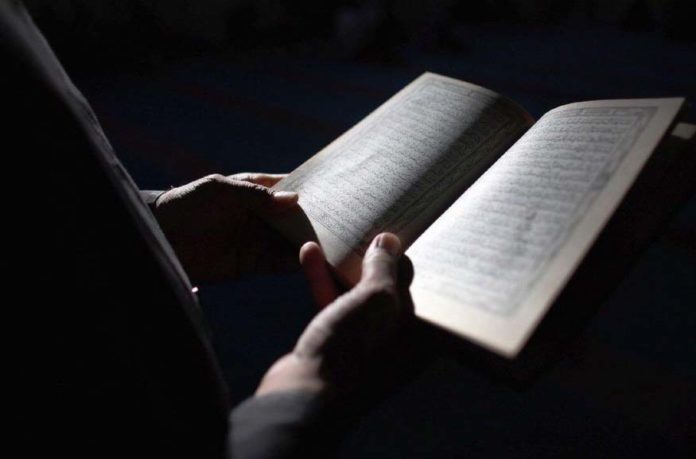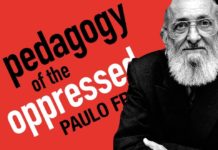Disclaimer: The Eqbal Ahmad Centre for Public Education (EACPE) encourages critical and independent thinking and believes in a free expression of one’s opinion. However, the views expressed in contributed articles are solely those of their respective authors and do not necessarily reflect the position or policy of the EACPE.
Muslims consider Quran as the literal revealed word of Allah and the most sacred and absolutely final book of guidance for all eternity and for all mankind. Pious Muslims read it often; it is supposedly the source of Islamic ideals, worship, practices and rituals. It is the source of all wisdom, Muslim law and practices. It also contains accounts of past peoples and events. The Quran in use today all over the world is identical and was as compiled and arranged after the death of the prophet (PBUH) by the third Caliph Hazart Usman (RA). It came from the recollection of prophet’s contemporaries and bits of written pieces throughout the life of the prophet (PBUH). Prophet Muhammad (PBUH) himself knew neither reading nor writing. Quranic Arabic is very precise, in the sense that the rules for its recitation are encoded within the text. This allows the Quran to be read uniformly in so far as phonetics, diction, articulation and pace of reading are concerned. Quran was interpreted about 1400 years ago by four Imams, each a native speaker of Arabic language and from Arab culture to come up with rules of Islamic jurisprudence called Sharia in use today. Quran is recited at nearly every kind of event in the life of an individual Muslim or in Islamic society.
All Muslims are supposed to understand and recite it often. Although it has been translated into nearly every known language of the world, Muslims still read it in Arabic. Some go a step further and memorize the entire book by heart. Five daily prayers of Muslims consist of selected verses of Quran. Quran, the book, occupies the highest and most exalted place in every Muslim household. Oaths can be performed on the Quran. It is read and recited in the month of Ramadan from end to end in every Mosque and many homes. Such is the devotion of Muslims to this book that the news of destruction or desecration of Quran can cause uncontrollable street protests and riots. Quran is understood to have such mythical and magical powers as to protect individuals, believers and indeed the entire universe from harm and destruction of evil and satanic forces. Muslims further believe that the Quran shall continue in its unaltered form until the end of time or judgment day. Every new printing of Quran is pored over in every detail for accuracy and authenticity. Study of Quran is divided into many disciplines, people who recite with most accurate diction, articulation, pace and emphasis are called Qari and the art is called Tajweed, those who memorize it by heart are called Hafiz, those who transcribe it are called Katib or calligraphers, those who interpret it are called Mufassir, those who issue legal opinions based on the Quran and other sacred texts are called Muftis and issue fatwas, those who issue verdicts on matters of Sharia law are called Qadis. The Quran as well as the saying of the prophet are called Hadith both are in classical Arabic. I hope the previous two paragraphs establish beyond a reasonable doubt how crucial and unimpeachable is the position of Quran in the Islamic faith. Additionally, a majority of sacred texts in Islam and nearly all of the rituals and prayers are performed in the Arabic language.
Nearly 80% of the world’s 1.6 billion or about 1.2 billion are non-Arabs, who neither speak nor understand Arabic, therefore, they depend on religious scholars to translate and interpret all of the teachings from Arabic into their indigenous vernacular whatever that may be.
Since all of the proceeding is a summary of Islamic practices the world over there is sure to be several simplifications and a lot of exceptions. I have seen time and time again that Muslims are attached unalterably to their religious ideas and they resist admitting contradictions or any need for rethinking. Instead, they build most unlikely and unrealistic scenarios justify long-held positions and attack the messenger and find faults with him. I expect a similar reaction to this piece.
This brings me to a most absurd point. Nearly 80% of the world’s 1.6 billion or about 1.2 billion are non-Arabs, who neither speak nor understand Arabic, therefore, they depend on religious scholars to translate and interpret all of the teachings from Arabic into their indigenous vernacular whatever that may be. They read Quran but without comprehension of what they are reading, they offer prayers and entreaties without understanding the contents, they memorize the Quran yet know not what it means. Essentially most of their interaction with the Almighty is in a foreign language. Yes there is small percentage of non-Arab Muslims who know the meaning of the most frequently recited verses of Quran. Literacy even in their mother tongue in Muslim countries is very low never mind a second language likes English or Arabic.
Recently sitting in a gathering of college educated multi-lingual bunch of relatives someone brought up the topic of Tajweed, the art of reciting the Quran with the precision and proficiency of a native classical Arabic speaker. They unanimously agreed that to recite the Quran with any imperfections was indeed a sin, it was arduous, time consuming but essential for Muslims to learn to read the Quran in that manner. I was dumbfounded these people are so concerned about phonetics and phonology of the sacred text, yet totally negligent of the real message. I tried unsuccessfully to steer the discussion in toward importance of understanding the message first than may if there is any time or energy left to put it toward its accurate recitation. But the devotees were determined that the accurate parroting of the text was more important than true understanding of it. It would be equivalent of a contemporary Christian interested in reciting bible in Latin with perfection and devoid of comprehension. Incredible devotion to form but none to content.
This is not new or isolated experience for me; I have seen Muslims opt for form over function, ritual over the spirit, illusion over reality every time. Long, long time ago I asked my father if Allah understands all languages then why do we have to do our daily prayers in Arabic. He explained, Arabic is a very vast language with a diverse vocabulary, almost no language could possibly express the finest shades of meaning with the precision of original Arabic text. To which my response was and remains, but I still have the limitations of my native tongue to understand Allah’s message.
In my humble opinion, the West has not truly appreciated the profound and rampant ignorance of Islamic societies. West in its zeal to be civil and liberal has ignored for the longest time the extreme poverty of ideas and inadequacy of Islamic peoples thinking and their leadership.

Download the article here as a pdf file.
About the Author:
 The author is a retired Pakistani Engineer, divides his time between Canada and Pakistan. A social observer of liberal values, and a secular humanist. Reader’s comments and critique is warmly welcomed and greatly appreciated. E-mail: spib1971@gmail.com
The author is a retired Pakistani Engineer, divides his time between Canada and Pakistan. A social observer of liberal values, and a secular humanist. Reader’s comments and critique is warmly welcomed and greatly appreciated. E-mail: spib1971@gmail.com









